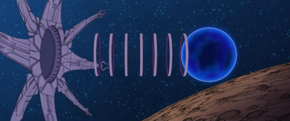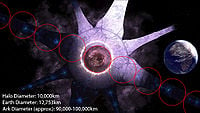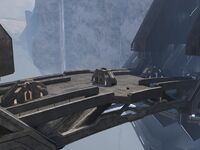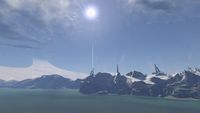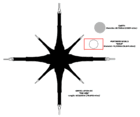Installation 00: Difference between revisions
From Halopedia, the Halo wiki
mNo edit summary |
|||
| Line 87: | Line 87: | ||
**''[[Origins]]'' | **''[[Origins]]'' | ||
*''[[Iris]] | *''[[Iris]] | ||
*''[[Halo: First strike]]'' | |||
**''[[Petra]]''{{Mo}} | |||
==Sources== | ==Sources== | ||
Revision as of 03:59, August 18, 2011
- "Where would someone go to activate the other rings?"
- — Lieutenant Commander Miranda Keyes
- "...Why, the Ark, of course."
- — 343 Guilty Spark
Installation 00, also known as The Ark or the Beginning Place,[1] was a Forerunner installation from which all the entirety of the Halo Array can be activated simultaneously.[2] Installation 00 also functioned as a safe haven from the Halo network's strategic pulse, and as a facility to construct replacement Halos. The Ark was situated outside the galaxy, about 218 (262,144) light years from the galactic center. In comparison, Earth is 25,000 light years from the galactic center.[3]
History
Like the rest of the Halo array, Installation 00 was likely created circa 101,000 BCE,[4] around eight thousand years after the conclusion of the human-Forerunner wars.[note 1] The Ark was designed to remotely activate every Halo ring from outside the array's blast radius. Installation 00 could be placed on standby mode via a fail-safe system that was activated by an aborted firing such as the one that occurred at the end of the Battle of Installation 05. In addition to serving as the firing control center for the Halo array, Installation 00 functioned as an automated factory to construct Halo installations, thereby ensuring that the Halo array was always ready to fire.[5][6] While originally designed solely as a construction and control center for the Halos, due to the Librarian's influence, the Ark was given a secondary function as a safe haven for life in the galaxy in the case of a galaxy-wide activation of the Halos; this is also the source of the name "the Ark".[4]
- "Every vessel we can fill, we send to the Ark. I dare not cease the mission. Not now, not until I've done all I can. Each one of these souls is finite and precious."
- — --A message from the Librarian to the Didact
Knowing that the Array would defeat the Flood through sterilizing the galaxy of any neurologically complex life, the Forerunners planned to preserve all life by storing it in the Ark. In this final resort plan, known as the Library Project, the Librarian was to index every sentient species in the galaxy and bring specimens of each to the Ark. These last sentient species would be stored on the Ark and would later reseeded on their original homeworlds after the Halo array had been activated.[7]
However, things did not go as planned. The Forerunner Contender-class artificial intelligence 05-032 Mendicant Bias, corrupted by the Gravemind, defected to the Flood and began fighting against his creators. Mendicant Bias knew of the Ark and how to access it through the Keyships, though he did not of its exact location. The Forerunners then constructed another military AI, Offensive Bias, in order to devise the best possible defense against Mendicant Bias and his fleet. The Librarian detonated all the Keyships under her command and spent her last days upon Mount Kilimanjaro, near the site of the slipspace portal to Installation 00 on Erde-Tyrene.[7]
Battle of Installation 00
- Main article: Battle of Installation 00
Immediately following the Prophet of Regret's botched invasion of Earth on October 20, 2552, the Prophet of Truth dispatched a Jiralhanae-led fleet to continue the assault and to uncover what he believed to be the Ark. By November 17, the Covenant had uncovered the structure they had spent the last month unearthing. Truth, though his Forerunner Dreadnought, activated the device, which was actually just a portal generating structure which led to Installation 00.
Truth led his fleet through the portal; after defeating a Flood invasion of the town of Voi, a joint United Nations Space Command - Covenant Separatist strike force followed the Prophet's forces.[8] Upon their arrival on December 11,[9] the latter force were attacked by the Covenant, which held a 3:1 numerical advantage.[3] Despite this, the Sangheili Fleet of Retribution crushed Truth's forces.
After engaging the Covenant across the installation, SPARTAN John-117 and Arbiter Thel 'Vadam entered the citadel, where they found Truth, who had been infected by the Flood. Soon after 'Vadam killed the Prophet, effectively destroying the Covenant and ending the war, he, the SPARTAN, and 343 Guilty Spark, the former monitor of Installation 04, discovered that a replacement Installation 04 was being constructed by the Ark's foundry.[5] The SPARTAN and the Arbiter soon rescued the AI Cortana, who held Installation 04's activation index, from the Flood-infested Covenant capital city, High Charity.[10] They, with Sergeant Major Avery Johnson, assaulted the Halo's control room to activate the ring, destroying both the Flood and the remaining Covenant forces. They succeeded, though Johnson was killed by the monitor, who refused to allow another Halo to be destroyed. The ring's activation tore the partially constructed installation apart, destroying the Ark.[6][11][12]
Design details

Installation 00 resembled a massive flattened dish with a series of eight curved arms, similar to the petals of a flower. Each arm possessed at least one petal station, from which Forerunner Lifeworkers operated.[13]
At the core of the installation was the stripped remnant of a material-rich planetoid, asteroid, or other celestial body used for the construction of the Halos. The entire upper surface was terraformed, with oceans, forests and a large desert.[3][5] Installation 00 appeared to have been between 90,000 to 100,000 kilometers (55,890 to 62,100 miles) in diameter.[14] The Ark was the second-largest known Forerunner construct, only dwarfed by the the micro Dyson sphere encased in the artificial planet Onyx, which has a diameter of 300 million kilometers.
Like the Shield Worlds, Installation 00 possessed an artificial sun.[3][5][6] However, this artificial star was not in place by 100,000 BCE; instead, the installation was illuminated by six shafts of plasma suspended over the petals, emanating from the center.[15] These plasma tubes would dim and brighten cyclically, approximating a day-night cycle.[16]
Like the Halos, Installation 00 featured a cartographer facility, a map room that could pinpoint any location on the installation.[3] Similarly to the Halos, the Ark featured a control room from which the array could be activated. This citadel was protected by a system of energy shield barriers that circled the center of the disk. These barriers were controlled by towers that circumscribed the center of the installation.[5]
The Ark's foundry, where the Halos are constructed, generates so much heat that the Ark requires multiple cooling stations. At least two such systems span a snowy gorge; it is possible that the massive cooling systems cause this icy climate.[17]
Environment
The Ark had a habitable surface on each of its spokes and on the majority of the inner circle, apart from the foundry. This terrain was intended to support catalogued life forms prior to being reseeded throughout the galaxy.[18] These landscapes and biomes were as diverse as those of Earth and of the Halos, consisting of deserts,[3] taiga,[5] and deciduous forests.[19] Several bodies of water occur across the installation. As such, the Ark can sustain its own ecosystem, providing a variety of habitation for many kinds of life.
Like most Forerunner constructs, the Ark's atmosphere is similar to that of Earth, being mostly comprised of oxygen and nitrogen. This means that all known sentient species, with the exception of the Unggoy, can survive on the surface without any form of protection. As with the Halos, Installation 00 features a widely varying range of climates.
As the Ark was located outside the galaxy, isolated in a black void of space, there were no nearby natural sources of light to power the installation and facilitate the survival of biological organisms on its surface. To counter this problem, the Ark was equipped with an artificial structure consisting of a bright, sun-like light, with several metal arms jutting from its center. The light source "scanned" over certain areas to generate day/night cycles, further contributing to the growth of vegetation and controlling weather patterns.[20]
Slipspace portals
A major aspect of Installation 00 was its ability to send and receive objects via slipspace portals. During the Battle of the Capital, the Forerunners attempted to evacuate the seven Halos which remained under their control to Installation 00, though only one escaped.[21] Later in the Forerunner-Flood War, the rebuilt Halo array was dispersed throughout the galaxy through the use of these portals.[22] In order to ensure the safety of humanity, the Forerunners established a portal-generating structure near Mount Kilimanjaro on the human homeworld of Erde-Tyrene. During the Human-Covenant War on November 17, 2552, the Covenant forces under the command of the Prophet of Truth utilized this portal, sparking the Battle of Installation 00.[8][3]
Trivia
- The history and name of the Ark are a reference to the Biblical story of Noah, who was instructed by God to build an Ark to save specimens of every animal on Earth from a great flood. The name may also be a reference to Ark of the Covenant, which, according to the Jewish Torah and the Biblical Old Testament, contains the stone tablets of the ten commandments. It is the holiest object of the Jewish faith.
- The Ark has some similarity to the concept of an Alderson disk. However, an Alderson disk is much larger and has a star in the center.
- In Origins, the Ark and the Halos are depicted without land on their surfaces during the activation of the Halo array. This is likely an instance of artistic license.
- The Ark was known as "Waypoint" during the production of Halo 3.[23][24]
Gallery
- 923831-Full.jpg
The Fleet of Retribution engaging Prophet of Truth's fleet over the Ark.
List of appearances
- Halo 2 Template:First mentioned
- Halo 3 (First appearance)
- Halo: Cryptum
- Halo Graphic Novel
- Second Sunrise Over New Mombasa (Mentioned only)
- Halo: Legends
- Iris
- Halo: First strike
- Petra(Mentioned only)
Sources
- ^ Halo: Cryptum, page 317
- ^ Halo 2, campaign level The Great Journey
- ^ a b c d e f g Halo 3, campaign level The Ark
- ^ a b Halo: Cryptum, page 274
- ^ a b c d e f Halo 3, campaign level The Covenant
- ^ a b c Cite error: Invalid
<ref>tag; no text was provided for refs namedHalo - ^ a b Halo 3, Terminals
- ^ a b Halo 3, campaign level Floodgate
- ^ Cite error: Invalid
<ref>tag; no text was provided for refs namedFortitude - ^ Halo 3, campaign level Cortana
- ^ Cite error: Invalid
<ref>tag; no text was provided for refs namedArray - ^ Cite error: Invalid
<ref>tag; no text was provided for refs namedBrutes - ^ Halo: Cryptum, page 332
- ^ Carnage.Bungie.org: Just how big is that Ark??
- ^ Halo: Cryptum, page 330
- ^ Halo: Cryptum, page 336
- ^ Halo 3 level Narrows: "Without cooling systems such as these, excess heat from the Ark's forges would render the construct uninhabitable."
- ^ Halo: Cryptum, page 334-336
- ^ Halo 3, level Isolation
- ^ Bungie.net: What IS this thing?!
- ^ Halo: Cryptum, page ???
- ^ Halo Legends: Origins
- ^ Isaac Hannaford: rapid environment work 2-6 hours a piece
- ^ halo.bungie.org: Re: Halo Concept Art
Note
- ^ While Halo: Cryptum gives conflicting years for the conclusion of the human-Forerunner wars and 10,000 years appears more frequently than 9,000, the latter is more specific and thus likely more accurate.
